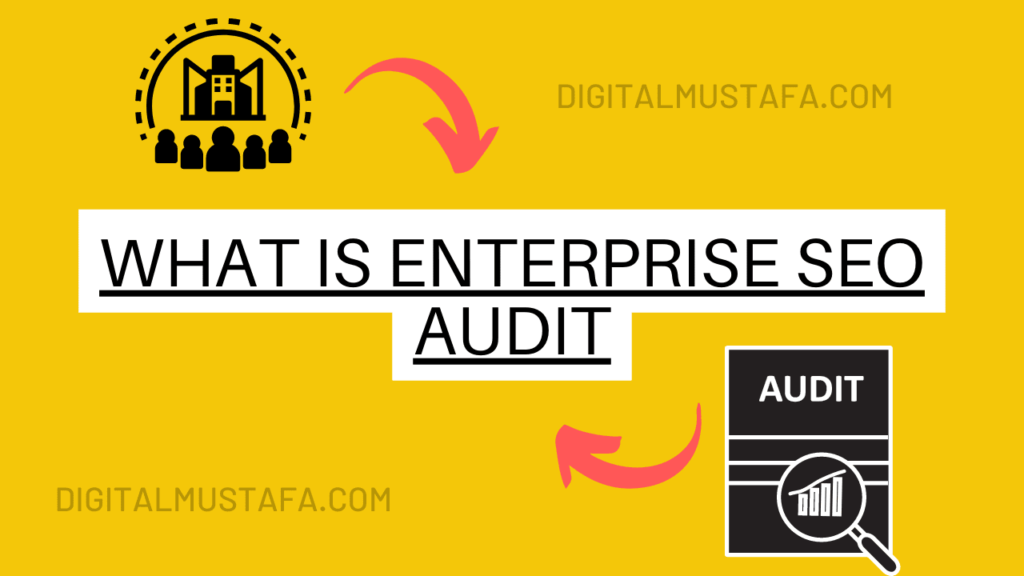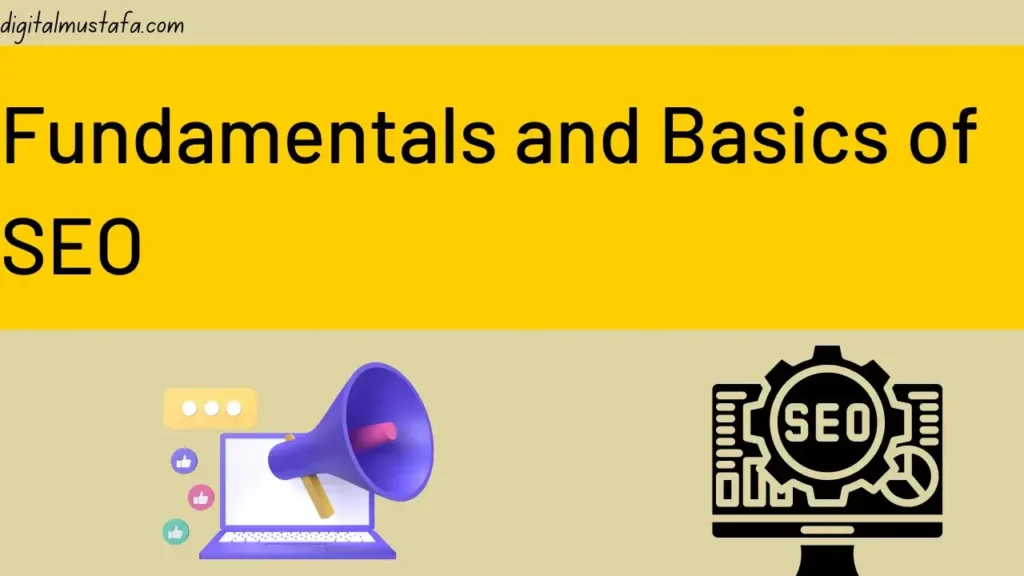Are you looking 🧐 for a complete guide on How to do an Enterprise SEO Audit, then look no further, because I’ve covered almost everything you need to know about Enterprise SEO audits.
After ready this complete blog post, I assure you that you’ll know everything you need to know about Enterprise SEO Audit.
I’ve spent several days researching legit data and content for you guys and finally I bought this complete guide. So don’t mistakenly skip this article if you are one of those people who want to learn more about this topic.
By the way, the term “Enterprise SEO Audit” is so easy and even I’m going to explain it in a simpler way. So I hope your every concept will be clear.
Don’t worry I’m not going to teach physics 😅.
So without moving to more emojis 😋, let’s get started with the introduction to enterprise SEO Audit
Introduction
In this section, I’ll be introducing you to enterprise SEO Audit. From what it is to its importance.
What is an Enterprise SEO Audit?

An Enterprise SEO audit is an in-depth analysis of a website’s current SEO status. In this audit, we aim to identify the potential parts for improvement in our site.
This type of audit is particularly relevant for large organizations or businesses that have a significant online presence because, in this type of audit, we are going for a comprehensive overview of our entire website’s performance.
In the next part (which is part of this section), we will discuss why conducting an Enterprise SEO audit is essential for organizations of all sizes, I mean we’ll start with the benefits.
Benefits of conducting an Enterprise SEO audit
🙂 So should we start with fun or direct to the point? Anyways, currently, I don’t have any jokes so let’s move.
There are several benefits of conducting Enterprise SEO Audits. I’m listing a few of them.
- It helps to Identify Technical Issues: An Enterprise SEO audit can help in identifying technical issues of a website that may be impacting its performance. Now by the term performance, I mean its speed, mobile-friendliness, and crawl errors.
- Helps to Improve On-page and Off-page Optimization: An Enterprise SEO audit can help identify opportunities to optimize on-page and off-page elements, such as meta tags, internal linking, and backlink profiles.
- Helps to Identify Content Gaps: An Enterprise SEO audit can help identify gaps in content that could hinder website performance. It can help identify content opportunities and highlight areas where existing content can be improved.
- Helps to stay ahead of the competition: By conducting regular Enterprise SEO audits, organizations can stay ahead of the competition by identifying and implementing best practices and new techniques in the field of SEO.
- Increase in Website Traffic and Conversions: An Enterprise SEO audit can help organizations increase website traffic and conversions by identifying and improving areas of the website that are not performing well.
Risks 😭 of not conducting an audit
In this small part, we’ll explore the 3 risks of not conducting an Enterprise SEO Audit.
- Several Opportunities May be Missed: Without an Enterprise SEO audit, organizations may miss opportunities to improve website performance and may not be aware of changes in the SEO landscape.
- Decrease in Website Visibility and Traffic: A lack of attention to SEO can lead to decreased visibility and traffic, as search engines may not rank the website as highly.
- May Impact Negatively on User Experience: Technical issues and poor on-page optimization can negatively impact the user experience, leading to decreased engagement and conversions.
Key 🔑 Components of an Enterprise SEO Audit
In the previous section, we have discussed the 5 benefits you’ll get after conducting an Enterprise SEO Audit for your website and we also explored the 3 risks of not doing so. In this section, we will dive into the key components of an Enterprise SEO audit.
Technical SEO Audit:
A Technical SEO audit is the first step in an Enterprise SEO audit. It involves analyzing the technical aspects of a website to ensure it meets search engine requirements for crawling and indexing. Technical SEO components include website speed, mobile-friendliness, site architecture, and crawlability.
It’s important to conduct a technical SEO audit because search engines prioritize websites that provide a good user experience. Websites that load quickly, are easy to navigate, and have a clear structure are more likely to rank higher in search results. Some of the most popular technical SEO tools include Google Search Console, Screaming Frog, and SEMrush.
On-page SEO Audit:
On-page SEO is the process of optimizing a website to improve its search engine rankings and getting more people to visit it by making changes to each page. On-page SEO elements include meta tags, header tags, using keywords, and internal or external links.
Learn more about On-Page SEO Factors: On-Page SEO Checklist & On-Page SEO Ranking Factors
It’s important to conduct an on-page SEO audit because search engines prioritize websites that provide high-quality, relevant content that is easy to navigate. A well-optimized page will also improve user experience and increase engagement. Some popular on-page SEO tools include Yoast SEO, Ahrefs, and Moz.
Off-page SEO Audit:
Off-page SEO is the process of improving things like backlinks, social media presence, and online reviews that are outside of our website but still, affect its search engine rankings.
There are several Off-page SEO factors. But as of now, I’ll recommend you focus only on quality links.
It’s important to do an off-page SEO audit because search engines give more weight to authoritative and popular websites. A well-optimized off-page strategy can also make people more aware of your website.
Ahrefs and SEMrush are two well-known off-page SEO tools.
Content Audit:
In the content audit, we analyze the content available on our website. We make sure that our content is high-quality, relevant, and engaging for our users. The 3 main components we are supposed to check in the content audit are:
- Quality of the content
- Relevancy of the content
- Structure of the content
It’s always important to conduct a content audit because search engines prioritize websites that provide high-quality and relevant content that is engaging to the audience.
Better user engagement and more conversions are two additional benefits of a content audit.
There are 3 tools that I’ll recommend for a content audit:
- Screaming Frog
- Google Analytics
- SEMrush
These 3 are just a few examples of popular content auditing tools.
How to Conduct an Enterprise SEO Audit
Now that we’ve talked about the most important parts of an Enterprise SEO audit, it’s time to talk about how to do one. It can be hard 😱 to do an audit, but if you follow these steps, you can make sure that you do a thorough audit.
Step-by-step guide on how to conduct an Enterprise SEO Audit
Step 1: Define Your Objectives
Before conducting an audit, it’s important to define your objectives. What do you want to achieve from the audit? Are you looking to improve website performance, increase visibility, or drive conversions? Defining your objectives will help you stay focused throughout the audit process and ensure that you are collecting the right data.
Step 2: Conduct a Technical SEO Audit
As we discussed earlier, the first step in conducting an Enterprise SEO audit is to conduct a technical SEO audit. This involves analyzing the technical aspects of a website to ensure it meets search engine requirements for crawling and indexing. Popular technical SEO tools include Google Search Console, Screaming Frog, and SEMrush.
Step 3: Conduct an On-page SEO Audit
The next step is to conduct an on-page SEO audit. This involves analyzing individual web pages to ensure they are optimized for search engines. On-page SEO components include meta tags, header tags, keyword usage, and internal linking. Popular on-page SEO tools include Yoast SEO, Ahrefs, and Moz.
Step 4: Conduct an Off-page SEO Audit
The third step is to conduct an off-page SEO audit. This involves analyzing external factors that influence a website’s search engine rankings, such as backlinks, social media presence, and online reviews. Off-page SEO components include link quality, link quantity, and social media engagement. Popular off-page SEO tools include Majestic, Ahrefs, and SEMrush.
Step 5: Conduct a Content Audit
The final step is to conduct a content audit. This involves analyzing the content on a website to ensure it is high-quality, relevant, and engaging. Content audit components include content quality, content relevance, and content structure. Popular content audit tools include Screaming Frog, Google Analytics, and SEMrush.
Tools to use for each step of the audit
As I already said, Google Search Console, Yoast SEO, Ahrefs, and SEMrush are all popular tools for doing an Enterprise SEO audit. Each of these tools can be used to do a different part of the audit, and it’s important to have a complete set of tools to make sure you get all the information you need.
Google Search Console is free, Yoast SEO also has a free plan, while SEMrush and Ahrefs are paid.
So if can’t afford these tools then you can contact us.
Must avoid these 2 common mistakes during the audit process
During the audit process, one common mistake to avoid is putting too much attention on one part of the audit while ignoring the others. It’s important to do a full audit of a website’s SEO performance that looks at all of its parts.
Another common mistake is not figuring out what your goals are before you start the audit. Without clear goals, it’s easy to lose track of what you’re trying to do and get lost in the data.
How to interpret the results of the audit
It can be hard to figure out what an Enterprise SEO audit means, but if you keep your goals in mind, you can make sure that your decisions are based on data. Look for ways to improve and put them in order of how much they affect your goals. You should also keep track of your progress over time to make sure that your SEO efforts are having the effect you want.
The Benefits of an Ongoing SEO Audit Process
It’s crucial to remember that search engine optimization is an ongoing process that requires constant monitoring and adjustment, even after an enterprise-level SEO audit has been conducted, you need to monitor your site. In this part, we’ll talk about why and how to do regular SEO audits.
Why an ongoing SEO audit process is necessary
The internet and its search engines are ever-changing, which means it requires ongoing monitoring. As a result, the strategies that were once successful for your website may no longer be as efficient now. It’s also likely that your competitors are tweaking their websites in an effort to boost their rankings, which could affect your own.
Websites that care about their search engine rankings must constantly review and tweak their SEO strategies. A continuous SEO audit method can help you do this.
Benefits of regularly conducting SEO audits
Regularly conducting SEO audits can provide several benefits, including:
- Avoiding search engine penalties and significant losses in traffic can be achieved through early detection and resolution of issues.
- Maintaining familiarity with evolving search engine rules: Search engine optimization (SEO) requires constant attention and strategy adjustments to keep up with ever-shifting search engine ranking algorithms.
- Boosting the Effectiveness of a Website: Better rankings, more visitors, and more sales are all possible outcomes of analyzing your site’s performance and making the appropriate improvements.
How to implement an ongoing SEO audit process
To implement an ongoing SEO audit process, you can follow these steps:
- Set a schedule: Decide on a regular interval for conducting your SEO audits, whether that’s monthly, quarterly, or annually.
- Define your goals: Determine what you hope to achieve with your audits, whether that’s improving rankings, increasing traffic, or boosting conversions.
- Use the right tools: Utilize the same tools used in the initial audit to track progress and identify areas for improvement.
- Analyze the data: Look at the data from your audit and determine what changes need to be made to improve your website’s SEO.
- Make necessary adjustments: Implement the changes identified in the audit to improve your website’s performance.
By following these steps and implementing an ongoing SEO audit process, you can continually improve your website’s SEO and maintain your search engine rankings.
Frequently Asked Questions (FAQs)
Wait, it’s not over yet. Here are some of the frequently asked questions about Enterprise SEO audits:
What is the difference between an Enterprise SEO audit and a regular SEO audit?
An enterprise SEO audit is customized to meet the requirements of large businesses with complicated websites, while a standard SEO audit may be performed on a site of any size. The technical, on-page, and off-page SEO variables, as well as the content itself, are often examined in greater detail during an enterprise SEO audit.
How often should an Enterprise SEO audit be conducted?
Several criteria determine how often an enterprise SEO audit should be performed. These include the website’s size and complexity, the level of competition in the market, and the availability of resources.
To keep up with any modifications to search engine algorithms or website structure, it is recommended to perform an enterprise SEO audit at least once a year.
What are the most important factors to consider during an audit?
On-page SEO factors like title tags, meta descriptions, and internal linking; off-page SEO factors like backlinks and social signals; and content audit factors like keyword research and optimization, content quality and relevance, and engagement metrics are the most important to consider during an enterprise SEO audit.
How long does it take to conduct an Enterprise SEO audit?
The duration of an enterprise SEO audit is relative to the scale of the website and the number of pages being inspected. Depending on the scope of the audit, the entire process could take weeks. This would include gathering data, analyzing it, and making any necessary adjustments.
What should I do after the audit is complete?
As soon as the audit is complete, you can focus on fixing the most pressing issues and boosting your website’s search engine optimization. Monitoring your development allows you to make course corrections as required.
How can I measure the success of an SEO audit?
Changes in search engine rankings, organic traffic, bounce rates, and conversion rates are just some of the website performance measures that can attest to the success of an enterprise SEO audit. Engagement indicators like social shares and comments can also be tracked.
Conclusion
In conclusion, an enterprise SEO audit is an essential part of the digital strategy of any sizable business. With the results of a thorough audit in hand, you can make the required adjustments to your website to boost its performance, climb the search engine ranks, and attract more visitors who are more likely to become paying customers. To make the most of your website, it is important to perform audits regularly and keep track of your progress.



